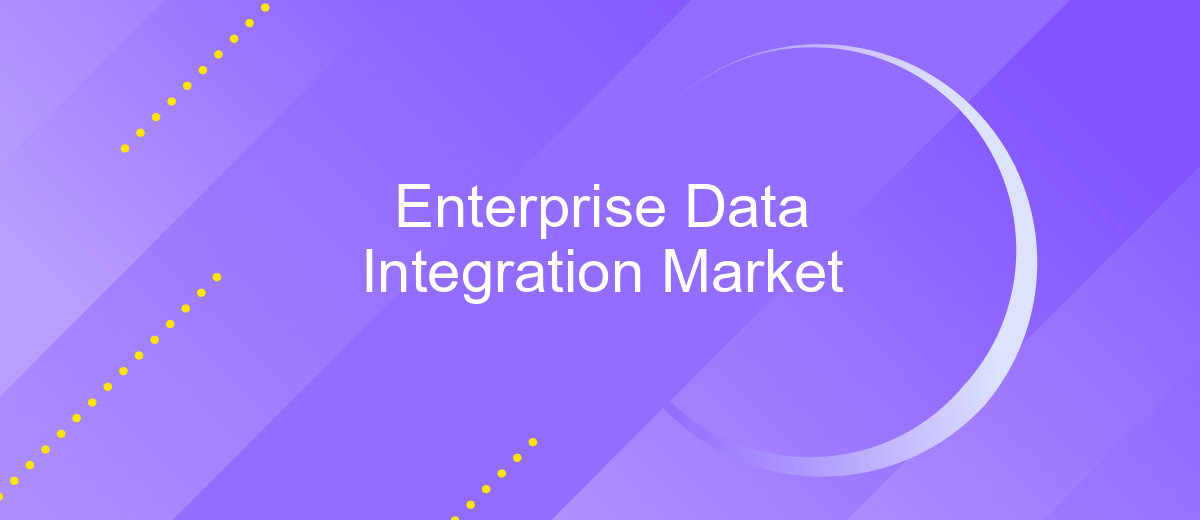Enterprise Data Integration Market
The Enterprise Data Integration Market is experiencing rapid growth driven by the increasing need for seamless data flow across diverse business systems. Companies are investing heavily in integration solutions to enhance operational efficiency, improve decision-making, and maintain competitive advantage. This article explores the latest trends, key players, and technological advancements shaping the future of enterprise data integration.
Executive Summary
The Enterprise Data Integration Market has experienced significant growth, driven by the increasing need for efficient data management and seamless integration across various business applications. Organizations are adopting advanced integration solutions to enhance operational efficiency, improve decision-making processes, and gain a competitive edge in the market.
- Growing demand for real-time data integration and analytics
- Rising adoption of cloud-based integration platforms
- Increased focus on regulatory compliance and data governance
- Expansion of the Internet of Things (IoT) and big data technologies
- Emergence of AI and machine learning in data integration
Services like ApiX-Drive play a crucial role in this market by offering robust and user-friendly integration solutions. ApiX-Drive enables businesses to automate data workflows, connect various applications effortlessly, and streamline their data management processes. As enterprises continue to prioritize data integration, the market is poised for further growth and innovation.
Market Analysis

The Enterprise Data Integration Market is experiencing significant growth, driven by the increasing need for businesses to streamline operations and enhance data accessibility. Companies are recognizing the importance of integrating disparate data sources into a cohesive system to improve decision-making and operational efficiency. This trend is further accelerated by the adoption of advanced technologies such as artificial intelligence (AI) and machine learning (ML), which require robust data integration frameworks to function effectively. The market is also witnessing a rise in cloud-based solutions, which offer scalability and flexibility, making them an attractive option for enterprises of all sizes.
One of the key players in this market is ApiX-Drive, a service that simplifies the process of integrating various applications and data sources. ApiX-Drive enables businesses to automate workflows and synchronize data across multiple platforms without the need for extensive coding knowledge. This ease of use and efficiency is particularly beneficial for small and medium-sized enterprises (SMEs) that may lack the resources for complex integration projects. By leveraging such services, companies can ensure seamless data flow and maintain a competitive edge in the rapidly evolving digital landscape.
Vendor Profiles

The Enterprise Data Integration Market is witnessing rapid growth, driven by the increasing need for businesses to seamlessly integrate various data sources and streamline their operations. Leading vendors in this market offer a range of solutions that cater to different integration needs, from cloud-based services to on-premises tools.
- IBM: Known for its comprehensive data integration solutions, IBM provides robust tools for both cloud and on-premises environments, ensuring seamless data flow across various systems.
- Microsoft: With its Azure Data Factory, Microsoft offers a powerful cloud-based integration service that supports data movement and transformation, enabling businesses to integrate data from multiple sources efficiently.
- ApiX-Drive: A versatile integration platform that allows businesses to connect various applications and automate workflows without the need for coding, making it an ideal choice for companies looking to streamline their data processes.
- SAP: SAP's data integration solutions focus on providing real-time data integration and management, helping businesses make informed decisions based on up-to-date information.
- Oracle: Oracle offers a suite of data integration tools that support data migration, transformation, and synchronization, ensuring data consistency and reliability across different platforms.
These vendors are at the forefront of the Enterprise Data Integration Market, providing innovative solutions that help businesses overcome the challenges of data integration. By leveraging these tools, companies can enhance their data management capabilities, improve operational efficiency, and drive better business outcomes.
Market Dynamics

The Enterprise Data Integration Market is experiencing significant growth due to the increasing demand for seamless data connectivity and real-time analytics. Organizations are increasingly seeking robust solutions to integrate disparate data sources, ensuring efficient data flow and enhancing decision-making processes. This trend is driven by the need to manage large volumes of data generated from various applications and systems.
Technological advancements and the adoption of cloud-based solutions are further propelling the market. Businesses are leveraging cloud platforms to achieve scalability and flexibility in data integration. Moreover, the rise of IoT devices and the subsequent data surge necessitate efficient integration solutions to harness actionable insights from diverse data streams.
- Growing demand for real-time data analytics
- Increased adoption of cloud-based integration solutions
- Rising importance of IoT and connected devices
- Need for seamless integration of disparate data sources
Among the various tools available, ApiX-Drive stands out by offering streamlined data integration services. It simplifies the process of connecting different applications and automating workflows, thereby enabling businesses to focus on core activities. As the market continues to evolve, the role of such integration platforms will become increasingly pivotal in driving operational efficiency and innovation.
Future Outlook
As the Enterprise Data Integration market continues to evolve, future trends indicate a significant shift towards more automated and user-friendly solutions. Companies are increasingly looking for platforms that can seamlessly integrate data from various sources with minimal manual intervention. This trend is likely to drive the adoption of advanced AI and machine learning technologies to enhance data integration processes, making them faster and more efficient.
Moreover, the demand for real-time data integration is expected to surge, driven by the need for immediate insights and decision-making capabilities. Services like ApiX-Drive are set to play a crucial role in this landscape, offering robust tools that simplify the integration process. By providing a user-friendly interface and automation features, ApiX-Drive enables businesses to effortlessly connect disparate data sources, ensuring a seamless flow of information. As a result, enterprises can expect more streamlined operations and better data-driven strategies in the coming years.
FAQ
What is Enterprise Data Integration?
Why is Enterprise Data Integration important?
What are the common challenges in Enterprise Data Integration?
How can businesses automate and streamline their data integration processes?
What factors should be considered when choosing an Enterprise Data Integration tool?
Apix-Drive will help optimize business processes, save you from a lot of routine tasks and unnecessary costs for automation, attracting additional specialists. Try setting up a free test connection with ApiX-Drive and see for yourself. Now you have to think about where to invest the freed time and money!

